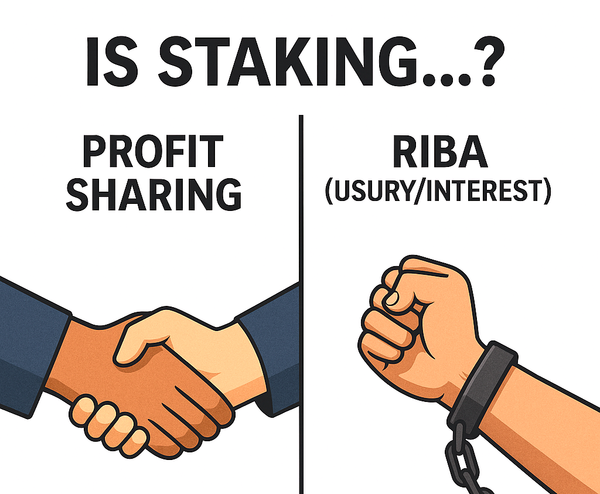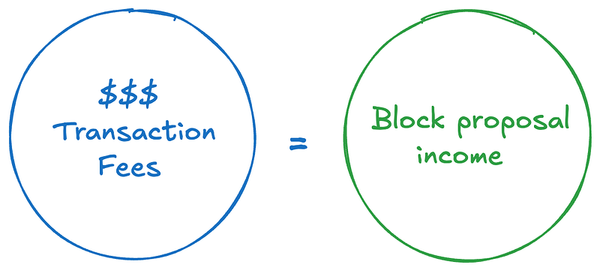Ethereum Block Proposal — Another Scholarly Perspective
By Sh Thibaud Saifullah, Shariah Advisor @ InshAllah Network

By Sh Saifullah Rouger, Shariah Advisor @ InshAllah Network
This article aims to analyze Ethereum block building and proposing from a Maliki fiqh point of view, following up on the research article on the topic written by Sh Farrukh Habib.
The TL;DR
- In its current form, proposing blocks is not a religiously permissible activity, as it implies validating impermissible transactions.
- Therefore, staking is impermissible unless a filtration process for haram contracts is implemented, enabling the block builder and proposer to submit Shariah-compliant blocks to the blockchain.
- Muslims seeking to stake Ethereum must adopt such processes, like Goldsand, to ensure near-certainty that their activity is permissible
1. Understanding the Activity
Sh Farrukh Habib provided a straight-to-the-point explanation that will help anyone without prior knowledge understand the Ethereum Block Proposal:
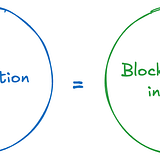
2. Legal Framework: Maqasid (Goals) vs Wasa’il (Means)
As articulated by the 15th-century scholar ibn ‘Asim in his poetic verses on the fundamental principles of jurisprudence:
All actions of legally responsible ones,
Are either means or goals
Actions can be categorized as one of the following:
- Maqasid — Goals, the intended outcomes of an action
- Wasa’il — Means, the actions taken as part of the causal chain in order to achieve the maqasid (goals)
2. Do the Means Justify the Ends?
The 14th-century scholar ibn Juzayy explained the following on the relationship between the means and goals:
Means are actions that enable one to attain their goal, and therefore their legal ruling is the same as the goal they lead to, provided the objective cannot be achieved without them.
In simpler terms, effective causes inherit the rulings of their outcomes.
This principle extends to the means to the means. For example:
Someone wants to attack another with a knife, visits a shop to purchase one, but finds none available. The shopkeeper refers them to a blacksmith who can forge the weapon. If both the shopekeeper and blacksmith are aware that this knife will be used unlawfully, they will be sinful for being active links in this chain of actions.
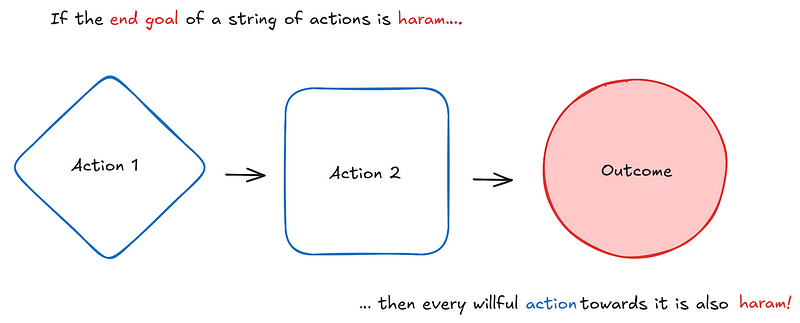
3. Application to Block Proposal
In Ethereum block building, the validator selects transactions (including impermissible ones) and places them in a block, and then “asks” for the block to be integrated into the blockchain. Without these actions, the transactions (including impermissible ones!) would remain incomplete.
Within these chain of events that ultimately lead to the completion of an impermissible transaction, we can see that the work of the proposers is essential. Thus, the default Ethereum block building process does appear to fall under the scenario described by ibn Juzayy.
Therefore, under default conditions, block proposals are impermissible without transaction filtering. Staking Ethereum is similarly unlawful, as it implies being wasilah (a means) for the validation of impermissible contracts.
3.1. But What About Block-Proposer Separation (BPS)?
Even under BPS, where the block builder that chooses the transactions is separate from the validators who receive the blocks to validate, the ruling remains unchaged. Unless the block proposer has reasonable assurance that the block excludes impermissible transactions, it cannot be deemed as permissible.
Despite the low percentage of impermissible transactions (~5%) in total transactions, analysis shows that they’re present in all blocks. Thus, without filtration, the proposer knows with certainty that they will be proposing impermissible contracts to the blockchain.
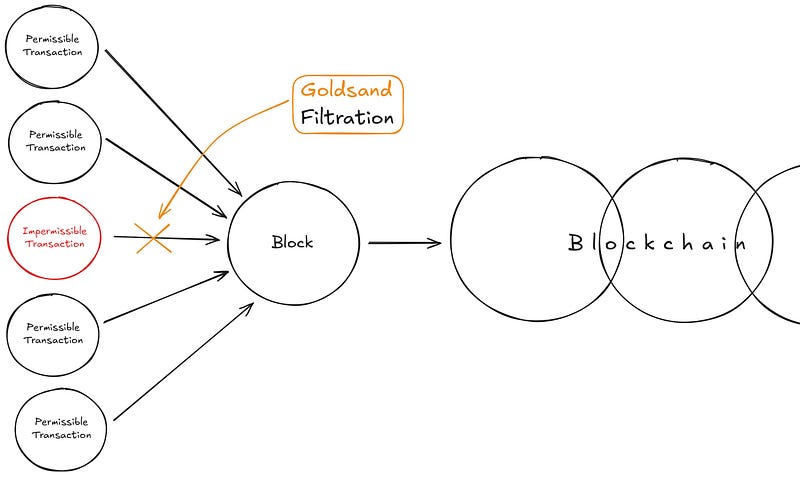
4. How Bad Can It Be?
It should be noted that scholars, such as the late Mauritanian scholar al-Wallati on his commentary of the aforementioned poetry by ibn ‘Asim, mentioned that the degree of impermissibility associated with the means is lesser in severity to the impermissibility of the goals themselves.
While the means may carry a lesser sin, it is still a sin nevertheless. None of us know where Allah will bestow His Mercy nor His Justice, and even seemingly minor actions may ultimately be mighty in the eyes of Allah.
This aligns with Imam al-Ubbi’s statement, cited by Sh Farrukh in his article:
Similarly, those who were present and approved the (impermissible) transaction are included. They are all equal in the curse because the transaction is not completed except through their collective involvement.
All the people mentioned in the Hadith* of the Prophet Muhammad (ﷺ) — the buyer and seller, the scribe and the witness — are essential elements to the completion of the impermissible transaction, and therefore are all impacted by the sin.
5. Conclusion
Considering the above, filtering out impermissible transactions in order to produce clean blocks that provide proposers the assurance of only dealing with Halal transactions is a necessity for Muslims who want to take part in the emerging crypto-financial world and the multitude of opportunities it can give us as a community.
*The Hadith of Prophet Muhammad (ﷺ):
حَدَّثَنَا مُحَمَّدُ بْنُ الصَّبَّاحِ، وَزُهَيْرُ بْنُ حَرْبٍ، وَعُثْمَانُ بْنُ أَبِي شَيْبَةَ، قَالُوا حَدَّثَنَا هُشَيْمٌ، أَخْبَرَنَا أَبُو الزُّبَيْرِ، عَنْ جَابِرٍ، قَالَ لَعَنَ رَسُولُ اللَّهِ صلى الله عليه وسلم آكِلَ الرِّبَا وَمُوكِلَهُ وَكَاتِبَهُ وَشَاهِدَيْهِ وَقَالَ هُمْ سَوَاءٌ.
Jabir said that Allah’s Messenger (ﷺ) cursed the accepter of interest and its payer, and one who records it, and the two witnesses, and he said: They are all equal.(Sahih Muslim 1598; https://sunnah.com/muslim:1598)



